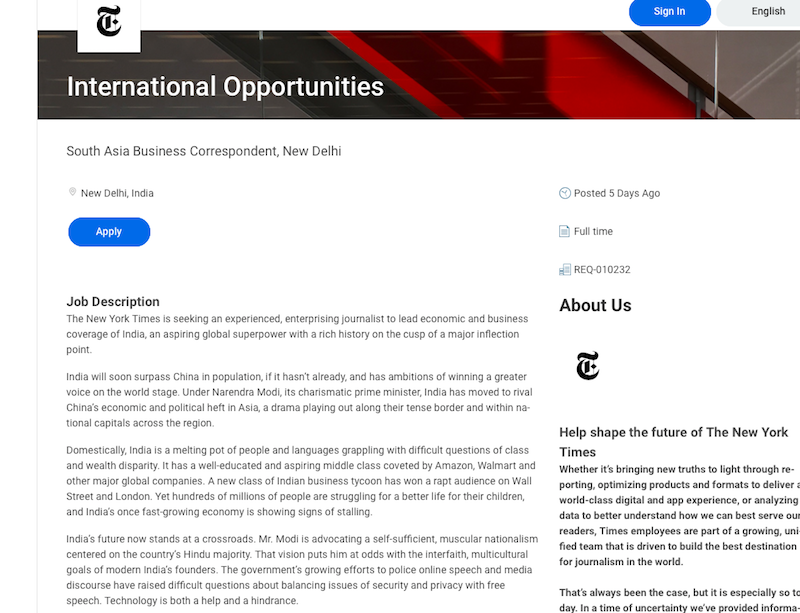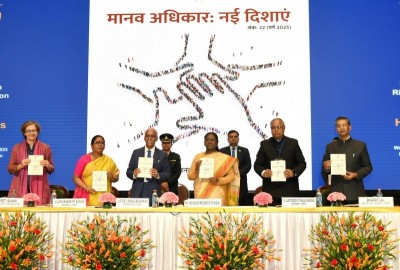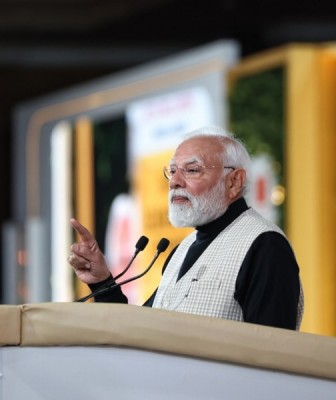 New York Times Ad
New York Times Ad
New York Times's opinionated ad for hiring India-based business correspondent raises hackles
New Delhi/New York: Known for its virulent anti-India stance since the Modi government came to power, iconic US daily New York Times (NYT) has drawn flak after an ad it posted for recruiting a New Delhi-based "South Asia Correspondent" used the word "drama" to describe the deadly India-China border clash that claimed lives of many Indian soldiers. The ad also painted the Indian Prime Minister as one who advocates a "self-sufficient, muscular nationalism centered on the country’s Hindu majority".
The semantics of the ad in describing the present day India and its Prime Minister and its border dispute with China reeked of inherent bias, according to many media watchers who felt the US publication has dropped all semblance of neutrality in reporting India with even its ad for hiring a correspondent laced with prejudices.
The ad reads: "India will soon surpass China in population, if it hasn’t already, and has ambitions of winning a greater voice on the world stage. Under Narendra Modi, its charismatic prime minister, India has moved to rival China’s economic and political heft in Asia, a drama playing out along their tense border and within national capitals across the region.
"Domestically, India is a melting pot of people and languages grappling with difficult questions of class and wealth disparity. It has a well-educated and aspiring middle class coveted by Amazon, Walmart and other major global companies. A new class of Indian business tycoon has won a rapt audience on Wall Street and London. Yet hundreds of millions of people are struggling for a better life for their children, and India’s once fast-growing economy is showing signs of stalling.
"India’s future now stands at a crossroads. Mr. Modi is advocating a self-sufficient, muscular nationalism centered on the country’s Hindu majority. That vision puts him at odds with the interfaith, multicultural goals of modern India’s founders. The government’s growing efforts to police online speech and media discourse have raised difficult questions about balancing issues of security and privacy with free speech. Technology is both a help and a hindrance."

The NYT position includes coverage of neighboring countries like Pakistan, Bangladesh, Nepal, Sri Lanka, Bhutan and the Maldives, each with its own rich history and complicated relations with its enormous neighbor, it adds.
The @nytimes has dropped all pretences of impartiality with this job ad for a South Asia Correspondent. They are clearly looking to hire an anti-Modi activist who can also stoke anti-India sentiments in our neighbourhood. With this, the paper qualifies as a foreign-funded NGO. pic.twitter.com/hw3QIRqjzn
— Kanchan Gupta (@KanchanGupta) July 2, 2021
The New York Times had published what many called an outrageous article some years ago in which it called the Indian saree as a symbol of Hindu nationalism. The article said promoting saree is an effort to align ‘party’s broader political program: to project multi-faith India, a country of more than 1.3 billion, as a Hindu nation.’
The article, which media experts said had nothing to corroborate the central idea, had evoked widespread condemnation and with many calling the effort of linking India's traditional dress for women to politics a far-fetched attempt to push a story against the Hindu nationalistic BJP that rules the country since 2014.
A New York Times Opinion Editor had resigned last year over liberal bias in the newspaper.
Bari Weiss was the Times opinion editor who had left firing off a resignation letter in which she stated that “a new consensus has emerged in the press, but perhaps especially at this paper: that truth isn’t a process of collective discovery, but an orthodoxy already known to an enlightened few whose job is to inform everyone else.”
Bari wrote in her NYT resignation letter posted on her blog: "My own forays into Wrongthink have made me the subject of constant bullying by colleagues who disagree with my views. They have called me a Nazi and a racist; I have learned to brush off comments about how I’m “writing about the Jews again.”
"Several colleagues perceived to be friendly with me were badgered by coworkers. My work and my character are openly demeaned on company-wide Slack channels where masthead editors regularly weigh in. There, some coworkers insist I need to be rooted out if this company is to be a truly “inclusive” one, while others post ax emojis next to my name. Still other New York Times employees publicly smear me as a liar and a bigot on Twitter with no fear that harassing me will be met with appropriate action. They never are."
Support Our Journalism
We cannot do without you.. your contribution supports unbiased journalism
IBNS is not driven by any ism- not wokeism, not racism, not skewed secularism, not hyper right-wing or left liberal ideals, nor by any hardline religious beliefs or hyper nationalism. We want to serve you good old objective news, as they are. We do not judge or preach. We let people decide for themselves. We only try to present factual and well-sourced news.







